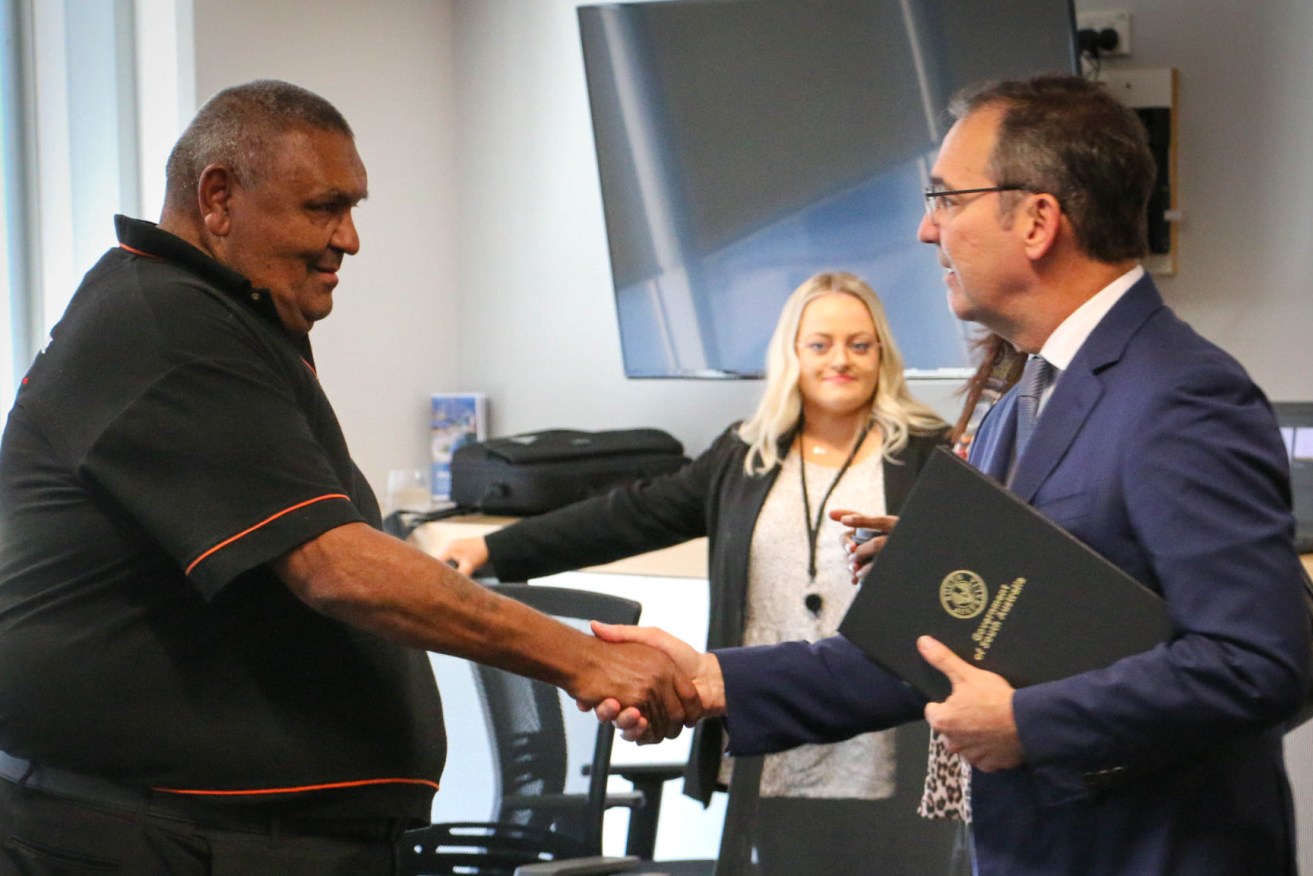“A native title system in crisis”: Marshall calls for evidence to spark judicial review
A group of Aboriginal and community leaders is calling for a “royal commission” into the native title system in South Australia – and Premier Steven Marshall says he is “prepared to consider any evidence” to justify a potential judicial review.

Mark Koolmatrie with Steven Marshall in 2019. Photo: Ninti Media
Mark Koolmatrie, chair of the Tribal Owners of Southern South Australia, is leading the charge for change, penning a call – in an opinion piece published in The Australian today – for the SA Government to instigate an inquiry.
Koolmatrie’s Aboriginal Reform Group of SA is demanding a judicial review “into the governance of Aboriginal corporations”, with the Ramindjeri man writing that “these concerns were raised with my friend, South Australian Premier Steven Marshall, before the last election [and] I was told that nothing could be done from Opposition”.
“The Reform Group believes there’s been so many failings in the way our communities are run, and the way service delivery is done,” he told InDaily today.
“There needs to be a total reform away from government [towards] have that voice for the community – because the community doesn’t have a voice.”
He said there is no current mechanism to address any alleged mismanagement or potential maladministration, saying “the ones you complain to are actually the problem”.
In a statement today, Marshall’s office said the SA Government “recognises that Aboriginal communities want to be empowered to manage their own affairs, as has been recognised in the new National Closing the Gap agreement”.
Marshall, who is also minister responsible for Aboriginal Affairs and Reconciliation, referred to Koolmatrie’s “commentary” that “indigenous corporations in SA receive ‘tens of millions of dollars annually through mining company payments under native title agreements’”.
“These are agreements to which the Government is not a party so has no role in enforcing their terms,” the Premier’s statement said.
“If [people] believe a ‘full judicial inquiry into governance of Aboriginal corporations and the actions of their lawyers’ is needed, the Government is prepared to consider any evidence they may have that would justify further action to ensure Aboriginal people are not denied access to benefits to which they are entitled through native title agreements or other agreements to support their aspirations.”
Koolmatrie said a systemic absence of financial records and oversight made procuring evidence difficult, arguing “no-one know what comes in and what goes out”.
He said “a financial audit needs to be done into everything [and] once that’s sorted out there should be a Royal Commission”.
“We can only deal with SA but this is a widespread problem in all states and territories,” he told InDaily.
“This is not just us – this is a whole native title system in crisis.”
CEO of SA Native Title Services Keith Thomas told InDaily last year there were “agitators” within certain Aboriginal groups raising concerns about how they were run, but “at the end of the day it’s the community as a whole that decided how they wanted to use the funds coming into this corporation”.
“They made a decision way back to set it up with about eight family trusts established, so when the money came in it was broken up on a percentage based on the number of people they had as members in each of those trusts,” he said at the time.
“I think it’s easy in hindsight to say, ‘look, [we] could have done better’ but that’s the decisions the community made.
“When you have people who have very low incomes or whatever else getting those few extra dollars, at the end of the day it means a lot to people because it means they are able to do stuff they wouldn’t normally be able to do [and] to make those changes now they would have to go back to a community meeting and get the community to agree that they don’t want to get the money anymore – that’s a hard thing to do I think.”
He conceded “there are issues there” but insisted “the Native Title Act is well-defined”.
“If [people] want to get on the board they’ll have to go through the AGM and then try and influence change within that group,” he said.
Want to comment?
Send us an email, making it clear which story you’re commenting on and including your full name (required for publication) and phone number (only for verification purposes). Please put “Reader views” in the subject.
We’ll publish the best comments in a regular “Reader Views” post. Your comments can be brief, or we can accept up to 350 words, or thereabouts.




